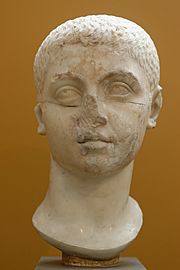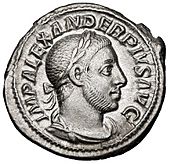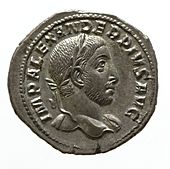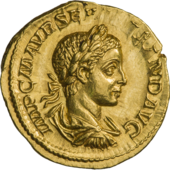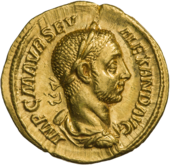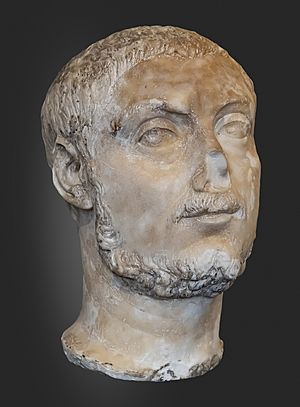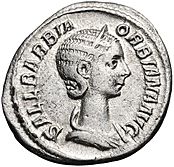Severus Alexander facts for kids
Quick facts for kids Severus Alexander |
|||||||||
|---|---|---|---|---|---|---|---|---|---|
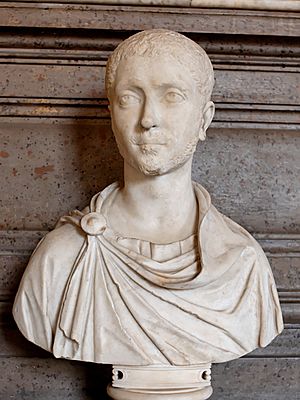
Bust, Musei Capitolini
|
|||||||||
| Roman emperor | |||||||||
| Reign | 13 March 222 – 22 March 235 | ||||||||
| Predecessor | Elagabalus | ||||||||
| Successor | Maximinus Thrax | ||||||||
| Born | Bassianus Alexianus 1 October 208 Arca Caesarea, Phoenicia (modern Akkar, Lebanon) |
||||||||
| Died | 21/22 March 235 (aged 26) Moguntiacum, Germania Superior (Mainz, Germany) |
||||||||
| Spouse | Sallustia Orbiana Sulpicia Memmia |
||||||||
|
|||||||||
| Dynasty | Severan | ||||||||
| Father | Uncertain, possibly Marcus Julius Gessius Marcianus | ||||||||
| Mother | Julia Avita Mamaea | ||||||||
| Religion | Syncretism of pagan, Orphic and Christian beliefs | ||||||||
Marcus Aurelius Severus Alexander (born October 1, 208 – died March 21 or 22, 235) was a Roman emperor. He ruled from 222 to 235 AD. He was the last emperor from the Severan dynasty, a powerful family that ruled Rome.
Alexander became emperor after his cousin, Elagabalus, was killed in 222. Sadly, Alexander himself was later assassinated. His death started a difficult time in Roman history called the Crisis of the Third Century. This period saw nearly 50 years of civil wars, invasions from other lands, and economic problems.
Alexander was the heir to his cousin, Emperor Elagabalus. Both Alexander and Elagabalus were grandsons of Julia Maesa. She was a powerful woman who helped Elagabalus become emperor.
Alexander's rule lasted 13 years, which was a long time for a Roman emperor. He was also one of the youngest emperors in Roman history. During peacetime, his rule was successful. However, Rome faced challenges from the new Sassanid Empire in the East and tribes from Germania in the North. Alexander managed to stop the Sassanids. But when fighting the Germanic tribes, he tried to make peace by talking and offering money. This made many in the Roman army unhappy. This led to a plot that ended with Alexander, his mother Julia Avita Mamaea, and his advisors being killed. After their deaths, Maximinus Thrax became the new emperor.
Contents
Early Life and Family
Severus Alexander was born on October 1, 208, in a place called Arca Caesarea in Phoenicia. This area is part of modern-day Lebanon. His birth name was Bassianus Alexianus.
Historians believe his mother was Julia Avita Mamaea. His father's identity is not fully clear.
Becoming Emperor
A Young Ruler Takes the Throne
Severus Alexander became emperor when he was about 14 years old. This made him one of the youngest emperors in Rome's history. His grandmother, Julia Maesa, thought he would be a better ruler than her other grandson, Emperor Elagabalus. Elagabalus was becoming very unpopular.
To keep her family's power, Maesa arranged for Elagabalus to adopt young Alexander. Then, she helped plan Elagabalus's assassination. This made sure Alexander would become emperor. The Roman army declared Alexander emperor on March 13, 222.
Throughout his life, Alexander relied a lot on his grandmother, Maesa, until she died in 224. He also depended on his mother, Julia Mamaea. As a young and new ruler, Alexander did not know much about government or war. But over time, the army began to respect his good character and calm behavior. This was very different from Elagabalus.
Improving Rome
With his mother's help, Alexander worked to improve life for the Roman people. He also tried to make the government stronger. He hired famous jurists, like Ulpian, to help with justice. His advisors included important people like the senator and historian Cassius Dio.
Alexander also created a special council of 14 people. They helped the city leader manage Rome's 14 districts. He reduced wasteful spending in the imperial court. He also repaired the Baths of Nero in 227 or 229. These baths are sometimes called the Baths of Alexander because of his work. He also built a large fountain, known as the Nymphaeum of Alexander.
During his rule, taxes were made lighter. He encouraged literature, art, and science. He also set up offices where people could borrow money with fair interest rates.
Alexander was open-minded about religion. He allowed a synagogue to be built in Rome. He even gave a special Jewish scroll, the Torah, to this synagogue.
He also helped his soldiers. He made sure soldiers could choose anyone to inherit their property in their will. He protected their property rights while they were fighting.
Military Challenges
Facing the Persians
Alexander's rule was mostly peaceful until the Sassanids rose to power under Ardashir I. In 231 AD, Ardashir invaded Roman lands in the East. This forced young Alexander to act quickly.
Alexander made Antioch his base. In 233, he planned a three-part invasion of the Sassanid Empire. He led the main army to take back northern Mesopotamia. Another army went through the mountains of Armenia, and a third attacked from the south. The northern army had some success. However, the southern army was defeated by Ardashir's skilled horse-archers. Alexander's own campaign was not a clear victory, and his army faced problems with discipline and disease.
Even though the Sassanids were stopped for a while, the Roman army showed a lack of discipline. In 232, there was a rebellion in a Syrian legion. They even tried to name a new emperor, Taurinus. Alexander managed to stop this uprising. After this, Alexander returned to Rome and celebrated a victory.
Problems with Army Discipline
Alexander's rule also saw a big drop in military discipline. In 228, the Praetorian Guard killed their leader, Ulpian, right in front of Alexander. Alexander found it hard to punish the soldiers who caused the riot. The soldiers then fought a three-day battle against the people of Rome. This battle ended after parts of the city were set on fire.
Historians say that soldiers were not as loyal or disciplined as before. This was partly because the Severan family's power was weakening. Also, Alexander seemed to be controlled by his mother and did not appear to be a strong military leader. The army was also unhappy because the emperor was slow to give them rewards.
The Germanic War
After the war with Persia, Alexander returned to Antioch. His mother, Julia Mamaea, asked a Christian scholar named Origen to teach Alexander about Christianity.
While Alexander was learning, tribes from Germania and Sarmatia invaded the northern parts of his empire. These new enemies appeared after Alexander's success in the Persian war. In 234, these tribes crossed the Rhine and Danube rivers. This caused great alarm in Rome. The Roman soldiers were already tired from the Persian war. They became even more unhappy when their homes were destroyed by the invaders.
As news of the invasion spread, the emperor went to the front lines to fight. The Romans prepared a large army. However, Alexander was not a very experienced general. He hoped that just the sight of his armies would make the enemy tribes surrender. Because of the heavy losses against the Persians, and following his mother's advice, Alexander tried to pay off the Germanic tribes to gain time.
This decision made the legionaries (Roman soldiers) lose respect for Alexander. They thought he was dishonorable and not fit to be emperor. Because of this, the army quickly looked for a new leader.
They found Gaius Julius Verus Maximinus. He was a soldier from Thrace with a great reputation. He had risen from a humble background to a high military position. With Maximinus gaining the army's support, the Severan Dynasty came to an end. The army's growing dislike for Alexander paved the way for his assassination.
Assassination and Legacy
Alexander had to face his German enemies in early 235. When he and his mother arrived, the situation was calmer. His mother convinced him that bribing the German army was a better way to avoid violence. Historians say this tactic, along with his soldiers' disobedience, ruined his reputation.
Alexander was assassinated with his mother on March 21 or 22, 235. This happened during a mutiny (rebellion) of the Legio XXII Primigenia in Moguntiacum (Mainz), while he was meeting with his generals. This event secured the throne for Maximinus.
Alexander's body was buried with his mother, Julia Mamaea, in a large tomb in Rome. This tomb, called Monte del Grano, is still visible today. A large stone coffin found inside this tomb in the 16th century is now in the Palazzo dei Conservatori Museum in Rome. Some sources say a valuable glass vase, the Portland Vase, was also found there. This vase is now in the British Museum in London.
Alexander's death marked the end of the Severan dynasty. He was the last emperor from Syria. He was also the first emperor to be overthrown by widespread military unhappiness. After his death, his economic policies were abandoned, and Roman money lost its value. This started the chaotic period known as the Crisis of the Third Century, which almost caused the Roman Empire to collapse.
Alexander's death also showed a new expectation for Roman emperors. Even though they weren't expected to fight personally, emperors were increasingly expected to be good military leaders. Alexander's choice to avoid battle, his methods of dealing with the Germans, and his less-than-successful Persian campaign were seen as unacceptable by the soldiers. Maximinus was able to take power by highlighting his own military skills compared to Alexander's perceived weakness. However, by taking the power to remove their emperor, the legions also started a period of chaos that lasted for 50 years.
Alexander was declared a god after Maximinus died in 238.
Personal Life
Family and Marriage
Alexander's only known wife was Sallustia Orbiana. He married her in 225 when she was 16 years old. His mother, Mamaea, arranged the marriage. However, when Orbiana received the title of Augusta (a special title for empresses), Mamaea became very jealous. Alexander divorced Orbiana in 227 and sent her away. This happened after her father was accused of treason and executed.
Some historical writings mention that Alexander might have been married to another woman named Sulpicia Memmia. However, this marriage is not certain.
Alexander is not known to have had any children.
Some ancient texts describe Alexander as being very close to his mother. He was also said to enjoy watching young dogs play with small pigs.
Religious Views
Historical accounts suggest that Alexander was very tolerant of different religions. He allowed a synagogue to be built in Rome. He also continued to give special rights to Jews during his rule. Some sources even claim that Alexander had images of Abraham and Jesus in his private chapel, alongside other Roman gods and famous figures.
See also
 In Spanish: Alejandro Severo para niños
In Spanish: Alejandro Severo para niños
- Severan dynasty family tree
 | Claudette Colvin |
 | Myrlie Evers-Williams |
 | Alberta Odell Jones |


